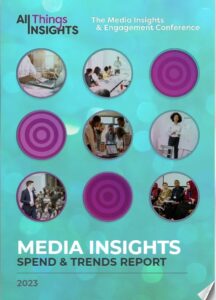More consumers today than in years past are aligning their purchases with their personal values by supporting brands who outwardly represent the values they personally believe in, including sustainability. Understanding these consumer values can help brands better leverage and step into their own environmental and sustainable goals, which in turn should better unlock highly desired brand transparency, authenticity and trust.
How is the consumer preference for sustainability impacting insights? Consumer preference for sustainability is driving companies to rethink their business models and product offerings. Insights teams are now tasked with understanding how these preferences shape consumer behavior, as well as using this data to inform decisions on sustainable products and services. Companies are also leveraging insights to identify new ways to reduce their environmental impact while maintaining profitability. This includes analyzing customer feedback, market trends, competitive intelligence and more in order to develop strategies that address the needs of consumers who prioritize sustainability.
Studying Sustainability In The Market
Consumers care about sustainability, and seem to back it up with their wallets. In a recent joint study from McKinsey and NielsenIQ, “Do consumers care about sustainability and ESG claims?” the companies studied a wide range of products over a five-year period, examining sales growth for products that claim to be environmentally and socially responsible.
The results seemed to indicate good news for authentic ESG-focused manufacturers and retailers, as solid sales seemed to back up consumer sentiment. The report noted that, “Over the past five years, products making ESG-related claims accounted for 56% of all growth—about 18% more than would have been expected given their standing at the beginning of the five-year period: products making these claims averaged 28% cumulative growth over the five-year period, versus 20% for products that made no such claims.”
For maximum impact, McKinsey recommends that brands, “Ensure that ESG product claims support an overall ESG strategy with a meaningful environmental and social impact across the portfolio.” The report further goes on to provide other insights, such as that companies should use a design-for-sustainability approach to the market, developing a process that embraces ESG-related claims alongside cost engineering. Investing in ESG through both existing brands and innovative new products, specific to each category and brand, further embraces the holistic, interconnectedness of ESG by creating products that address multiple concerns.
McKinsey concluded, “There is strong evidence that consumers’ expressed sentiments about ESG-related product claims translate, on average, into actual spending behavior. And this suggests that companies don’t need to choose between ESG and growth. They can achieve both simultaneously by employing a thoughtful, fact-based, consumer-centric ESG strategy.”
Defining Consumer Preferences
For the Insights community, delving into this complex topic presents challenges, yet opportunities to define consumer traits and preferences in the sustainability space. All Things Insights queried ChatGPT to identify at least some of the core trends tied to the growing consumer awareness of sustainability.
- Increased Demand for Sustainable Products: Consumers are increasingly looking for products that have minimal environmental impact and are manufactured sustainably. This includes items like organic food, natural health and beauty products, eco-friendly clothing, renewable energy sources, and sustainable materials such as bamboo or recycled plastics.
- Boost in Recyclable Packaging: More companies are turning to recyclable packaging as a way to reduce their environmental footprint while still providing consumers with the convenience of single-use packaging. Companies are also incorporating more biodegradable options into their product offerings or using refillable containers instead of disposable ones.
- Support for Ethical Business Practices: Consumers now expect businesses to be transparent about their sourcing practices and ethical standards when it comes to production processes, labor conditions, waste management systems, etc. They want assurance that the company is doing its part in protecting both people and the environment from harm caused by irresponsible business decisions or actions taken during production cycles.
- Conscious Consumption Habits: Many people are becoming more thoughtful about what they buy – opting for fewer but higher quality items rather than buying a lot of low cost throwaway goods – as well as how much they consume overall in order to reduce their individual ecological footprints.
Contributor
-

Matthew Kramer is the Digital Editor for All Things Insights & All Things Innovation. He has over 20 years of experience working in publishing and media companies, on a variety of business-to-business publications, websites and trade shows.
View all posts






































































































